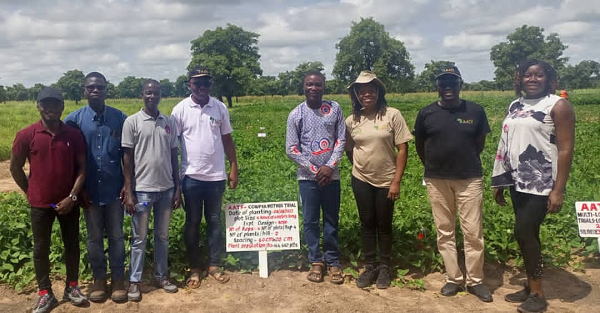
Farmers in Ghana have confessed to expecting the genetically modified, pod-borer resistant (PBR) cowpea, which requires less insecticide and less water to yield more.
A statement by the communication officer for West and Central Africa, African Agricultural Technology Foundation (AATF), Alex Abutu said the variety of cowpea has been developed by researchers at the Council for Scientific and Industrial Research-Savanna Agricultural Research Institute (CSIR-SARI) in Tamale, Ghana and was recently granted environmental release approval by the National Biosafety Authority (NBA), making it the first transgenic food crop to be released in Ghana.
The researchers are currently undertaking a national performance trial in Kpasenkpe near Walewale in the northeastern region and Chinchang and Silbelle near Tumu in the Upper West region as part of the requirements for the commercialisation of the new variety.
Cowpea is considered an important food and nutritional security crop in the country.
Officials from the NBA, the Municipal Agricultural Development Unit (MAU) and the Program for Biosafety Systems (PBS) accompanied the PBR cowpea team from the African Agricultural Technology Foundation (AATF) and SARI during the site visit to monitor the progress of the research and to ascertain farmers’ impression about the variety.
In his comments during the visit, the project lead scientist at SARI, Dr. Jerry Nboyine said the PBR cowpea was developed to help farmers overcome the devastating effects of legume pod-borer in cowpea cultivation.
He said this was the first season the new variety was being tested on farmers’ fields after being tested under confinement for nearly a decade.
Once the cowpea is released, he said, the era of over eight sprays on cowpea fields during a crop season will be over.
“The farmers will now be able to cut costs and increase yield because this cowpea requires only two sprays,” he said.
In his remarks, the project manager, AATF, Dr. Jean Baptiste, confessed to being impressed with the quality of the trial and the management approach adopted by scientists from SARI. Also, he assured farmers that they would soon have access to the variety that is already performing well in Nigeria.
“With the PBR cowpea, farmers can be confident of bumper harvest as the major impediment to cowpea farming has been taken care of,” said Baptiste.
Earlier, a cowpea farmer from Chinchang, Tommie said in addition to having to spend a lot of money to control pests, they were also concerned about the negative effects of the chemicals on their health.
He accepted to be part of the open trial when he was told that this new variety required only two sprays.
“When you check the pods of this new variety, you will realise that they are well-filled because they have not been eaten by pests. There are also more pods in the Bt cowpea fields compared to the non-Bt ones,” he said.
In his remarks, the municipal director of agriculture for the West Mamprusi Municipal Assembly, Sulemana Alhassan said the cowpea trial had many benefits, including affording farmers training on PBR cowpea cultivation. He said the new variety will contribute significantly to reducing pesticide abuse in cowpea cultivation.
The NBA used the visit to officially hand over the permit for environmental release to CSIR-SARI’s director, Dr. Francis Kusi. The permit is valid for three years and is subject to renewal.


